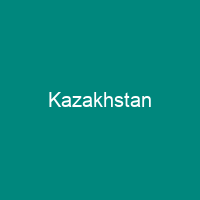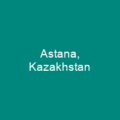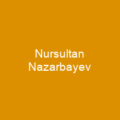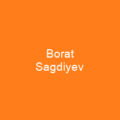Kazakhstan, a vast landlocked country in Central Asia, is like an expansive canvas painted with diverse landscapes and rich history. Imagine a nation that stretches across two continents, bordered by six countries, each contributing its own unique cultural brushstrokes to the grand picture of Kazakhstan’s identity.
Geography and Demographics
Kazakhstan is home to 18.9 million people (as of 2019), with a population density that remains one of the lowest in the world. The country’s terrain varies from the vast Kazakh Steppe, which covers about 804,500 square kilometers, to the majestic Altay Mountains and the Caspian Sea. Cities like Astana and Almaty stand as bustling hubs amidst this diverse landscape.
Historical Influences
Kazakhstan’s history is a tapestry woven with threads of nomadic Iranian peoples, Mongol Empire, Russian Empire, and various other empires that have left their mark. The country became an autonomous republic within the Soviet Union in 1936 and declared independence in 1991. Since then, Kazakhstan has been navigating its path towards a more democratic and economically prosperous future.
Government and Politics
The government of Kazakhstan is structured with a bicameral parliament but is rated as a ‘consolidated authoritarian regime’ by Freedom House. Recent reforms under President Kassym-Jomart Tokayev have aimed to support opposition, public assembly, and loosening party formation rules. These changes reflect the country’s ongoing efforts to balance tradition with modern governance.
Economic Landscape
Kazakhstan boasts a strong economy with a GDP of $179 billion and an annual growth rate of 4.5%. The country is a leading energy producer, exporting uranium, wheat, textiles, and livestock. Its oil reserves are estimated at 6.1 billion tonnes, making it the 19th largest oil-producing nation in the world.
Education and Culture
Educational opportunities in Kazakhstan are universal and mandatory through to secondary level, with an adult literacy rate of 99.5%. The country’s people are expected to speak three languages: Kazakh, Russian, and English. Education is conducted in either Kazakh or Russian, reflecting the linguistic diversity of its population.
Cultural Heritage
Kazakhstan’s cultural heritage is rich and diverse, with notable contributions from literature, music, and fine arts. The country has a vibrant film industry and hosts various film festivals. However, the media landscape faces challenges, with some outlets facing censorship and suppression.
Sports and Entertainment
Sports play a significant role in Kazakhstan’s culture, particularly boxing, where athletes like Gennady Golovkin have achieved global recognition. The country also boasts strong performances in other sports such as football, basketball, and ice hockey.
Tourism Potential
While tourism currently accounts for only 0.3% of Kazakhstan’s GDP, the government aims to increase this by attracting foreign direct investment and establishing five tourism clusters by 2020. The country’s natural beauty and historical sites offer immense potential for growth in this sector.
Conclusion
Kazakhstan is a nation rich in history, culture, and resources. As it continues to evolve, the challenges of balancing tradition with modernity remain at the forefront. With its vast landscapes, diverse population, and growing economy, Kazakhstan stands poised to make significant contributions to both regional and global affairs.

You want to know more about Kazakhstan?
This page is based on the article Kazakhstan published in Wikipedia (retrieved on December 29, 2024) and was automatically summarized using artificial intelligence.







